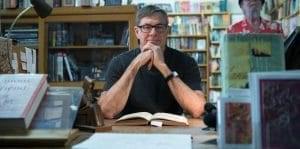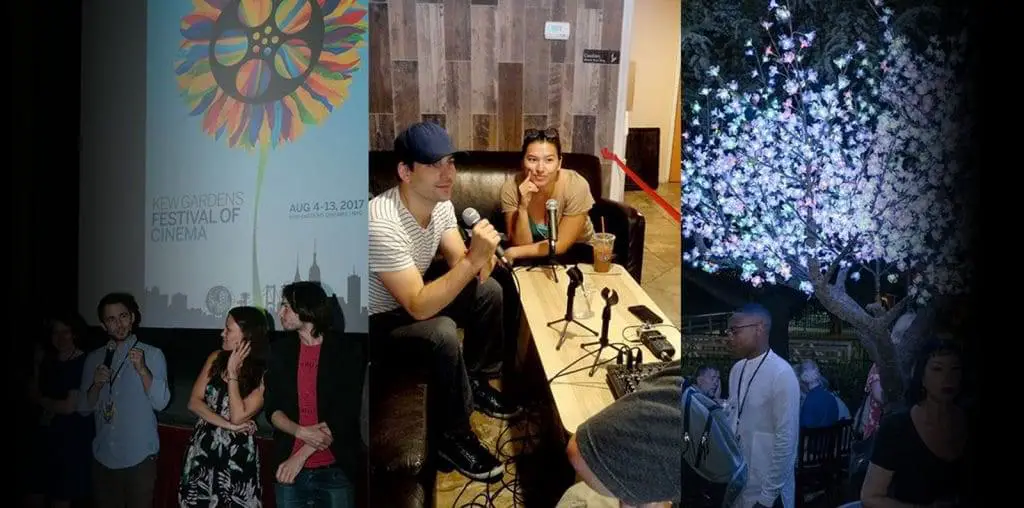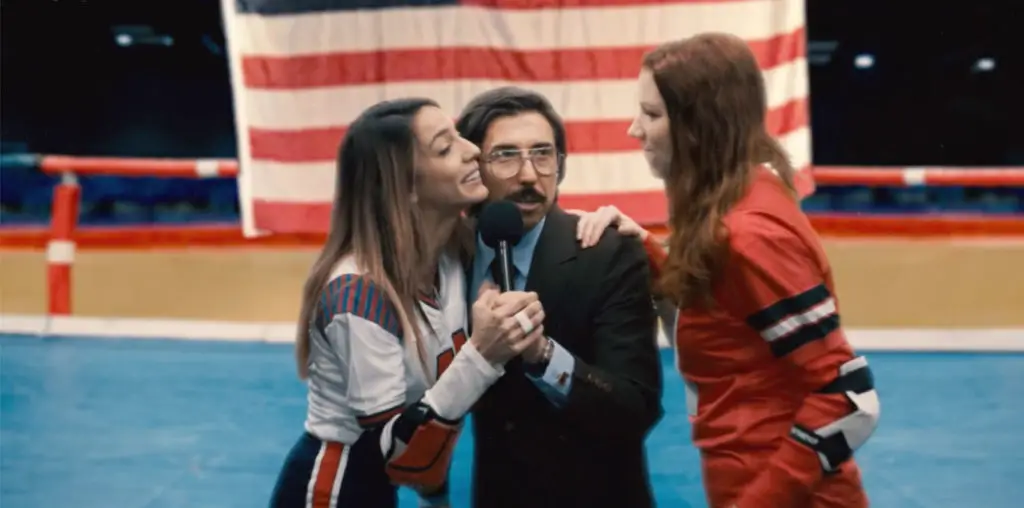
Recently, I had the amazing opportunity to speak to Gus Van Sant on the phone about his new film, Don’t Worry, He Won’t Get Far On Foot, a biopic of the late Portland cartoonist, John Callahan. It’s an intimate, honest film about the journey through alcohol recovery. We talk about sobriety, Udo Kier, and the future (?) of Hollywood. Read on!
I know that originally Robin Williams bought the rights to “Don’t Worry…” and brought them to you. You had to change some things because Robin was older than Joaquin (Phoenix) so what was the original idea versus what we see now?
Gus Van Sant: Well originally, it was his whole life story, more than we see now. Now, I’m concentrating on his alcohol recovery. In the book, there were lots of things from when he (John Callahan) was first born, raised by a family in rural Oregon, attended Catholic school, and all the way through his cartooning, to him trying to find out how to get a cartoon published and a lot of different parts of his life. We didn’t get far enough (with Robin Williams) to actually plan how we would shoot it. I think it was going to be Robin (playing John Callahan). John was the same age as Robin and also myself. At the time it was the ‘90’s so we were in our 40’s. Some of the book was in his 40’s but most of the book was in his 30’s so we were just gonna cheat it.
What would you say personally resonates with you the most about Callahan’s story? How do you relate to his addiction or his struggles? What ticked with you about his story to make you want to do this film?
Well, there was a famous cartoon he did called I Thought I Was An Alcoholic. I think that was one of his first published pieces. It was sort of a centerpiece of his life. He spoke in terms of that moment when he finally decided to stop drinking and that his problem wasn’t the wheelchair. When you try to do a biography, you can do the whole life, which is sometimes too much for a two-hour movie. So you usually try to figure out, what is the important thing about this character and for me it was that. I do relate to it but I’ve never stopped drinking, so you know..
There were parts of his sobriety that I didn’t understand. He was very funny about it but he was also very, very committed to it. I only knew him after he got sober. There were people that I knew, who did know him before that when he was not sober. Walt Curtis, who wrote Mala Noche, worked in a grocery store and he sold cheap wine. John was actually one of his customers. He would come into his grocery and they got to know each other because John was really well read and funny, and he was a local character. Walt’s relationship with him was interesting because he (Callahan) was an alcoholic wanting to be a cartoonist, and they just thought, “this poor guy.” He has a dream but how can he ever fulfill his dream?
The alcohol recovery seemed to be one way to go about it, and there’s a really good friend of his who saw the movie. He thought that it would have been better not to make that the story. There’s another story we could tell. You could have the recovery in there, but you could tell the story of him becoming a celebrity. I sort of bypassed that because it’s usually not very fulfilling to watch.

“…that moment when he finally decided to stop drinking and that his problem wasn’t the wheelchair.”
Well, it’s done a lot too.
Yeah, It’s done a lot, so I thought the redeeming thing about him was his recovery and also there hadn’t really been a successful recovery film, and I thought there could be. I thought that the other ones were something missing. I made that the way I was able to focus on one thing in his life.
Something I’ve noticed a lot of successful creative people’s careers struggled with various forms of addiction or compulsion. I wanted to know if maybe you thought there was a correlation between having an addictive personality and being an artist?
Gus Van Sant: Yeah. I don’t think that I was picking up on that because the addiction overshadowed everything in John’s story about himself. I wasn’t really thinking about other artists. Before we made our movie, I saw a documentary about Gahan Wilson. He’s a cartoonist, and a large part of that is his drinking, and he stopped drinking at a certain stage of his life. It is common, but I forgot about that side of it.
Beth Ditto is awesome in the film, and you had William S. Burroughs in Drugstore Cowboy, and Harmony Korine in Last Days. I wanted to know if you feel that there’s anything different about directing non-actors. What’s your favorite part of working with people who don’t act all the time?
In general, they can perform in front of the camera and not be uptight or self-conscious. They can be good because they don’t come with a lot of hang-ups or a lot of experience. Also, I think it would be hard to maybe use an unknown character to play in a certain way if you’re relying on their “range.” They’re really some of the best actors. They already are the character.
In Beth’s case, she really hadn’t done anything before. She had a little thing in a Tom Ford movie (Nocturnal Animals), but she didn’t have any lines, and I think she told me that she couldn’t remember lines like she can’t do it that way. Although she can sing so she must be able to remember it partly. I guess she was only able to do it in the audition. She couldn’t read from the script and act at the same time. Although she could tell us about the character and she was so funny talking about the role, I just thought, “We’ll make it work,” you know?
They’re really quite different. I think that non-actors are easier to direct. They have nothing else to go on, as where the actors are filtering what you say. You direct them, and they’re considering that, but they also have other ideas, you know? Whereas the non-actors don’t have any other ideas. They just do whatever you say. You make a film where you’re gonna do sixty takes, it’s very hard.

“…[non-actors] really some of the best actors. They already are the character.“
Well, I loved Beth Ditto. I’m from the South,. Her character (Reba) reminded me of a distant relative of mine. She really personifies that Southern Lady thing.
I think she was playing…or her inspirations were her mother and her aunt.
Next, I love Udo Kier, and he’s in My Own Private Idaho, of course. I just feel like he’s such a great character just as a person.
Yeah, I’ve known Udo for a while. I met him when I went to the Berlin Film Festival with Mala Noche and it was a very small film and it was my first film festival. He came into this bar, and I was there with the festival director of that particular section and somebody at the table said “Oh, look who just walked in!” Udo was a little drunk and they were already expecting him to come over to our table. I knew him through Andy Warhol’s movies, mostly. I didn’t really know him as a German actor, but as a Warhol actor. I said to him, I have this part, which was in My Own Private Idaho of this German autoparts salesman and he was like, “Oh I will play this!” and I said “Okay great” and I thought to myself “Well, this will never happen.” We’re talking about the film, but it’s too impossible. By the time I make it, who knows when that’ll be? But, when we did do it, we called him and he was still as excited.
Nowadays, I live near him in Palm Springs, so I’m in touch with him a lot. He really goes all over the world, all the time. He pretty much never says no. He’s playing low-budget films. He’s playing these commercials. He’s doing big budget films. He’s just doing all of it.
I’ve always thought of you as a director who appears not to compromise your artistic vision. You’ve been successful at making these unique and awesome films. What kind of advice do you have for filmmakers who are trying to make something that doesn’t fit so easily into the Hollywood machine?
I don’t know. The Hollywood machine’s kind of blown apart because of Netflix and all of the other streaming services. Nowadays, it’s like the only thing Hollywood really wants to make is an action movie, so if it’s not some kind of action movie, which for me, it’s not. If it’s anything else, there’s a lot more opportunity now. I think the streaming sites DO want something that’s completely unique. I don’t know if it’s for the better, but they’ve changed. I used to want Hollywood to fall apart, but now that it is, it’s kind of sad. It is changing.

“…there’s a lot more opportunity now. I think the streaming sites DO want something that’s completely unique.”
Yeah, it’s like things they would call “B-movies” and “A-movies” are now on tv.
Yeah, and they want them to be really long. They want like a series.
Do you think that there’s hope for people who want to have a career path similar to yours anymore?
I think it’s easier now. Because there’s so much need for it…and on so many different platforms. When I was starting out, in order to get somebody to look at a movie, you’d have to have a projector and you’d have to, like, send them the print of your film. So, now, you can now post it on Vimeo for the world to see.
That’s true.
—-
Thanks for reading my interview with Gus Van Sant. I hope you enjoyed reading it as much as I enjoyed talking to him, though I don’t know how possible that is, considering Gus Van Sant has been a hero of mine since I can ever remember. Don’t Worry, He Won’t Get Far On Foot is now streaming on Amazon Prime!


